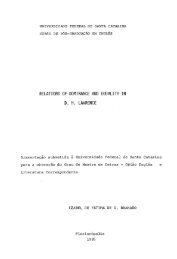Caracterização físico-química e comportamento reológico de sucos
Caracterização físico-química e comportamento reológico de sucos
Caracterização físico-química e comportamento reológico de sucos
Create successful ePaper yourself
Turn your PDF publications into a flip-book with our unique Google optimized e-Paper software.
ABSTRACT<br />
The growing interest of the society for fruit and/or vegetable juices and pulps in<br />
several ways is responsible for advances in the beverages market. Fruits and<br />
vegetables are nutritional sources of vitamins, minerals and soluble<br />
carbohydrates, which amount of these components varies from vegetable type<br />
and species. Formulations of blends ready to drink can be used to improve the<br />
nutritional characteristics of certain juices by addition of nutrients supplied by<br />
different fruits and vegetables, such as carrot and orange mix. Carrot is a rich<br />
source of vitamins, and its great content of carotenoids and minerals like<br />
calcium, sodium and potassium, has antioxidant properties that help to prevent<br />
free radicals responsible for cellular aging. Orange juice is an important source<br />
of ascorbic acid, a nutrient also with high antioxidant effect that stimulates the<br />
immunological system. The rheological behavior of juices is strongly affected by<br />
physical and chemical properties, and as a consequence will be <strong>de</strong>pen<strong>de</strong>nt of<br />
the fruit or vegetable type, or processing steps used such as enzyme treatment<br />
or pasteurization. The knowledge of the rheological characteristics of juices is<br />
indispensable not only as a quality measure, but also as a fundamental<br />
parameter to be used in projects such as pumping, agitation, tube transport,<br />
evaporation, and so on. This work attempts to the physicochemical<br />
characterization and rheological behavior of different mixtures of carrot and<br />
orange juices. It was evaluated pasteurized and enzyme treated-pasteurized<br />
carrot juice, and pasteurized orange juice. Cru<strong>de</strong> carrot juice was treated with a<br />
mixture of commercial enzymes Pectinex Ultra-SPL (Novozymes), at 1 unit L -1<br />
concentration, applying temperatures of 50-55 °C to the pulp for 1 hour.<br />
Pasteurizing operating conditions were 100 °C for 1 hour. Juices were<br />
evaluated by pH, acidity, <strong>de</strong>nsity, and contents of ash, reducing and total<br />
sugars, soluble and total solids, pectins fibers and proteins. Statistically<br />
significant modifications were observed for all physicochemical properties<br />
studied for the different treatments applied to the carrot juice, except for total<br />
solids and fiber contents, according to the Duncan test at a significance level of<br />
23

















